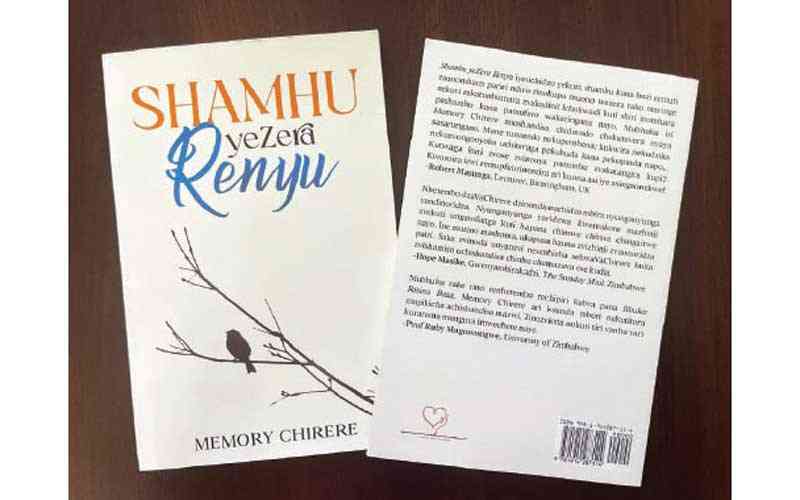
“Roving in the mental ploughshares of Memory Chirere’s Shamhu yeZera Renyu…”
A Batsirai Chigama Book Review
Published 2023 by Carnelian Heart Publishing
Author: Memory Chirere
This book review was translated by Tinashe Muchuri from Shona to English. It first appeared in the Shona language at: https://www.batsiraichigama.com/2024/08/shamhu-yezera-renyu/
In my reading journey, there has been books that I read and finish in a day. Sometimes I can go through a book in a day or two or three. Then there are books that I take quite long to go through. A month, a year or years and so on.
Memory Chirere’s Shamhu YeZera Renyu is a book that declares from the onset, saying to the reader, "I am hot-hot."
Take me in slowly like a hot cup of tea and put me down periodically. Come back to me and take a sip because I will be hot all the way…
- Covid-19 disrupted ZIBF impetus
- Book review: A review of Memory Chirere’s Shamhu YeZera Renyu (Outstanding Poetry Book at Nama 2024)
- Literary luminaries gather as Ngwenya explores creativity and identity
- Exploring themes in Portrait of Emlanjeni
Keep Reading
I read such books in between some of the one-day books. I proceed that way, reading various books concurrently.
I am happy that I have eventually gone through Shamhu yeZera Renyu without having to rush.
I have gone through it, sipping it and placing it down and sipping again.
I agree with Robert Masunga’s words (on the blurb) when he says that “In this book there is the voice of the passer by, who sees without being seen…”
This is evident in poems like, Chimunhu Chisina Rudo, kuDhirowa, Chirume chaSekai, Mbudzi, Mudzanga weFodya and especially Baba vaTino.
Gradually the eyes of the passer by become your eyes. Together you see what he sees, you and the passerby standing together in the open where, ironically, nobody sees you. And finally, you become part of the panorama that you are viewing.
Suddenly you find yourself shelling the maize with that boy, Tino. You rise with Tino to hug his father, the constant intruder. You are with Tino when he brings the floral shirt, an awkward present from his dad to Gugu’s dad.
You feel pity for Gibson Chiseko because, like his name means, he is something of a pathetic laughingstock.
Then you may even wonder what exactly is going on behind the scenes between Gugu’s dad and Tino’s mom.
You just quit before resolving that ominous puzzle.
Memory Chirere has an amazing way with words. He makes you want to laugh and sometimes he makes you shed tears.
This poet sees the world in a very unique way. Memory Chirere reminds me of the British author, Martin Goodman (whom I met during a writer’s programme facilitated by the British Council called the Crossing Borders Writers’ Project), who said, something like - in a country at war, with bombs dropping, people dying, there are some chaps in the same place who may actually be falling in love; some of them even getting to wed.
In such places filled with strife, some babies are actually being born!
The writer has to make a choice of what he has to write about. I think Chirere is one writer who sees a rose and consciously ignores the thorns for the time being.
One Rodney T Munemo, writing recently in the Newsday, says that Memory Chirere refuses to be taken captive by the pains that the nation may be going through because he has the courage to coexist with whatever strife obtains.
Chirere has developed the ability to walk though fire as if he were walking with a friend. From the way he writes about the troubles of the nation, he makes the reader rise above all this because to see the funny side of suffering as Chirere does, is not an easy thing.
Only a uniquely committed and brave writer does that! Most of us may not be able to do that.
As strife blows, Chirere reports about surviving…
“…tichiri vapenyu nekuti hapana kana akafa!” and he also writes: “kune mbeu dziri kubuda muvhu nyoro riri panze apo nekuti kuchine zuva rinokudza kana zvinhu zvakaringana saizvozvi…”
In this book, Chirere teaches me to search for all those things that many readers and writers still have not been able to come to terms with.
He invites you to laugh even at some of the usually sad scenarios. His is a liberating laughter.
I can’t continue… because I want you to buy this book and read it yourself. You will understand me when you get to poems such as Kutsvodana, Kuonesesa, Vana Vandakaticha, Nezuro, Maraya naMareta.
With that Kutsvodana poem, you will wonder at the depth and breadth of this wedding kiss because it is painted like those record-breaking kisses from the Guiness Book of Records.
During that formidable kiss, time stretches relentlessly like chewing gum, taking the onlooker back in time. It is funny, but it is also underlined by an eternal sadness. Then there are poems that are so direct like:
“Tiri mukanwa mechinhu
chiri kutitsenga zvishoma nezvishoma.
Zvishoma nezvishoma nezvishoma.
Chombomira pachinenge chamhoreswa:
“Makadiiko Mhukahuru?”
Chobva chatanga kutitsenga zvakare…”
You ask, what is chewing us up? Is it man or beast? The poet writes somewhere that “Vanhu vemazuva ano vachaziva here musiyano wemubvunzo nemhinduro?” (The struggle between appearance and reality?)
The poem called Mukanwa is one of the poems with subterranean meanings. You may fit in your own meanings.
It is in the same league with poems Kutadza, Basa, Munhu WekuZimbabwe, Detembo Risina Musoro and Zvaipa.
You may actually read and re-read these poems, picking a new meaning on each trip.
Shamhu yeZera Renyu was published in 2023 by Carnelian Heart Publishing and it won the Nama (Outstanding Poetry Book) in 2024.
It is going to be the last book to win that category since the category is now being discontinued in 2025.
About the book reviewer
- Batsirai Chigama (Zimbabwe) is a performer, poet, literary activist, and social commentator. City of Asylum described her work as “surprising, shocking, and skilfully deliberate work,” and “a breath-taking embodiment of grief.” Her latest book of poems is called For Women Trying to Breathe and Failing (it's not your fault)
About the translator
- Tinashe Muchuri is a renowned Zimbabwean author, journalist, actor and storyteller. Together with lawyer and author, Petina Gappah, he translated George Orwell’s Animal Farm into Shona, and got it published under the title Chimurenga Chemhuka.






